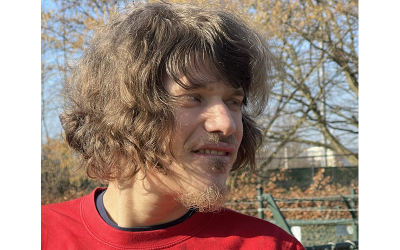Christopher has an ultra-rare disease called Pitt-Hopkins syndrome, a neurodevelopmental condition which causes delayed motor development and moderate to severe intellectual disability.

Christopher's mother talks about Pitt-Hopkins syndrome (PTHS), and why more research into rare diseases is needed.
Can you tell us about Christopher's condition and how it affects his life?
Children and adults with PTHS tend to be either non-verbal or have a limited vocabulary. In many cases they may have severe constipation which can in some lead to serious gastro-intestine issue. Signs of PTHS can include daytime apnoea and hyperbreathing caused by the dysfunctional autonomic nervous system.
Christopher thankfully hasn’t got the gastro-intestinal problems that many children and adults with PTHS have. He doesn’t have the hyperbreathing but has sometimes had some daytime apnoea. His motor delay meant he didn’t walk till he was nine and can’t pull himself to standing from the floor or stand from sitting in a chair. Christopher has some sensory issues and cannot for instance cope with loud noises but on the whole is a very laid-back, content young man.
Has Christopher had any treatment and if so, what impact has this had?
Christopher has had physiotherapy since he was a year old (doctors labelled him a heavy lazy baby and me an overanxious mother). From 18 months he had an intensive home therapy programme. He has also had music therapy for many years. Cranial Sacral therapy and hyperbaric oxygen therapy we did when available. He managed to get a few sessions of Conductive Education at age five and nine and this really helped with the initiation of his independent walking. Christopher had eight tonic clonic seizures in an 18-hour period when he was around four years old, and was put on anti-seizure medication, and they stopped immediately. He was weaned off the medication when he was about 10 and the seizures have thankfully never returned.
Why is research into rare diseases so important?
I believe that every individual and their family have the same need to know more about their condition as someone with a common condition. However, there is not enough funding and interest to carry out all the research for each condition, but the need is still there. With many ultra-rare syndromes and conditions any research has to be pushed for by parent and patient groups. For people with Pitt-Hopkins research into improving their quality of life is very important.
What would you say to other people with a rare disease who are in need of support?
When Christopher was diagnosed with Pitt-Hopkins syndrome the first thing I did was look for a support group. I made contact with Contact a Family (now known as Contact) and was told they knew the name of the syndrome but there was not a support group and suggested I start one. I didn’t realise that at the time Christopher was one of the first to be diagnosed by blood test based on the gene TCF4. My advice would be to search for a support group or charity. It may not be easy, and you might have to start you own. Forums like Contact and Inspire are great places to start!
Also, many people find each other on social media. As Beacon (an organisation that aids the development of rare support groups) says: “support groups are one of the few outlets that can be turned to for credible information, understanding and support. Patient support groups advocate for their community by hosting family conferences, leading research projects, launching awareness campaigns and recommending treatment for approval to regulatory bodies.”
What are Christopher's plans for the future?
Sadly no one knows the future but as Christopher cannot live independently what happens when we can no longer care for him depends on others. At the moment he lives at home but one day he will need to live outside his present home. Ideally, he would be in a small community where carers will be looking after him and others. Hopefully this will be near family and he will be able to enjoy life to the full.
Related
 Close
Close

